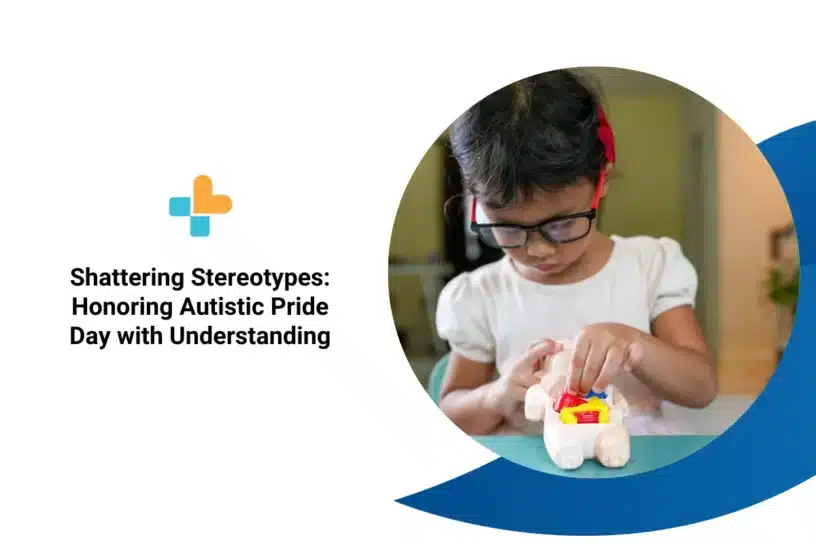Every year, on June 18th, the world comes together to celebrate Autistic Pride Day, a day dedicated to recognizing and embracing the uniqueness of individuals on the autism spectrum.
Did you know that according to the World Health Organization, one in every 160 children globally has autism spectrum disorder (ASD)? This staggering statistic highlights the importance of understanding and accepting those with ASD.
In this article, we’ll examine the symptoms, underlying causes, and diagnosis of autism spectrum disorder to understand better what this illness includes.
What is Autism Spectrum Disorder (ASD)?
Autism spectrum disorder is a neurodevelopmental disorder characterized by challenges in social interaction and communication and repetitive behaviours.
ASD is called a “spectrum” because it encompasses multiple abilities, challenges, and characteristics. While no two individuals with autism are the same, they may share certain commonalities in their experiences.
Understanding the nature of ASD leads us to explore the signs and symptoms associated with this condition.

What are the Signs and Symptoms of Autism?
Autism manifests in various ways, and recognizing the signs and symptoms is crucial for early identification and intervention. Here are some common indicators.
1. Social Communication Challenges
- Difficulty with eye contact and nonverbal communication cues
- Impaired social interactions and challenges in understanding social norms
- Difficulty initiating or maintaining conversations
2. Repetitive Behaviours and Restricted Interests
- Engaging in repetitive movements or actions, such as hand-flapping or rocking
- Developing intense and narrow interests, often focusing on specific topics
- Preference for routines and resistance to change
3. Sensory Sensitivities
- Heightened sensitivity to sensory input, such as sounds, lights, textures, or smells
- Overwhelmed or distressed in environments with sensory stimuli
- Seeking sensory input or avoiding certain sensations
What Causes Autism?
There’s no one cause for autism. Research suggests that the risk of autism develops from a combination of genetic, non-genetic, or environmental factors.
For example, having a genetic disposition won’t necessarily mean you’ll develop autism. Likewise, someone exposed to environmental factors associated with autism may not always develop the disorder.
Risks Factors of Autism
- Maternal Factors: Giving birth at the age of 35 or more, experiencing premature labour and delivery, and facing birthtime complications
- Medication Exposure: Use of valproic acid or thalidomide during pregnancy
- Genetic Factors: Presence of chromosomal abnormalities and certain genetic conditions
- Familial Factors: Having a sibling who has autism
Diagnostic Process for Autism
- Comprehensive Evaluation: A thorough assessment conducted by professionals, including observations, interviews, and standardized assessments
- Developmental History: Gathering information about the individual’s early childhood milestones and behaviours
- Behavioural Observations: Examining social communication skills, repetitive behaviours, and sensory sensitivities
- Collaborative Approach: Involving multiple specialists, such as psychologists, paediatricians, and speech-language therapists, to reach a diagnosis
Understanding the causes and diagnostic process of autism sets the foundation for embracing autistic pride and promoting neurodiversity.
How Can We Embrace Autistic Pride, Promote Neurodiversity, and Support Autistic Individuals?
Embracing autistic pride, promoting neurodiversity, and supporting individuals with autism are essential for fostering an inclusive society. By recognizing the strengths and unique qualities of autistic individuals, we can create a more accepting and accommodating environment for everyone. The following are the key factors.
1. Embracing Autistic Pride
- Recognizing autism as a natural part of human diversity
- Celebrating the unique strengths and abilities of individuals with autism
- Challenging negative stereotypes and stigma associated with autism
- Celebrate those with autism through Autistic Pride Day and World Autism Awareness Day
2. Promoting Neurodiversity
- Acknowledging and valuing different neurological profiles
- Creating inclusive environments that accommodate diverse needs
- Appreciating the contributions of neurodiverse individuals to society
3. Supporting Autistic Individuals
- Advocating for accessible education and employment opportunities
- Encouraging social inclusion and acceptance
- Providing resources and support networks for individuals and their families
Compassionate Care for Autism and Beyond
As we celebrate Autistic Pride Day, we must remember that autism is not a disorder to be cured but a beautiful part of our diverse human tapestry. By understanding and accepting individuals with autism, we can create a world that celebrates neurodiversity and embraces the unique strengths that come with it.
We at Ayu Health Network of Hospitals value delivering comprehensive and compassionate care to all our patients, including those with autism. Our dedicated team of highly skilled doctors and therapists is committed to offering the best treatments and therapies to help individuals with autism manage their symptoms and lead fulfilling lives.
We invite you to visit Ayu Health and explore our range of services. Our affordable treatment options ensure that quality care is accessible to all.
Also read: How Ayu Health Ensures the Best Clinical Outcomes
FAQs
1. What is the Significance of Autistic Pride Day?
Autistic Pride Day celebrates the diversity and strengths and promotes the acceptance and understanding of individuals with autism.
2. How Can I Support Individuals with Autism on Autistic Pride Day?
You can support individuals with autism on Autistic Pride Day by spreading awareness of autism, challenging stereotypes against the disorder, and creating inclusive environments that embrace neurodiversity.
3. Is Autism a Disorder that Needs to be Cured?
No, autism is not a disorder to be cured. Its unique neurological profile contributes to the beautiful tapestry of human diversity.
Our Hospital Locations
General Surgery Hospitals in Chandigarh | General Surgery Hospitals in Bangalore | General Surgery Hospitals in Jaipur | General Surgery Hospitals in NCR | General Surgery Hospitals in Hyderabad
Our Doctors
General Surgery Doctors in Chandigarh | General Surgery Doctors in Bangalore | General Surgery Doctors in Jaipur | General Surgery Doctors in NCR | General Surgery Doctors in Hyderabad
References:
https://www.ncbi.nlm.nih.gov/pmc/articles/PMC7082249/
https://www.autismspeaks.org/what-causes-autism
https://www.ncbi.nlm.nih.gov/pmc/articles/PMC4511955/
About the Author

Dr. S. Goel
Dr. S. Goel is a renowned Internal Medicine Specialist currently practicing at Ayu Health, Bangalore. He is a Specialist in Internal Medicine, Diabetes HTN, Paediatric Care, and Family Medicine.




